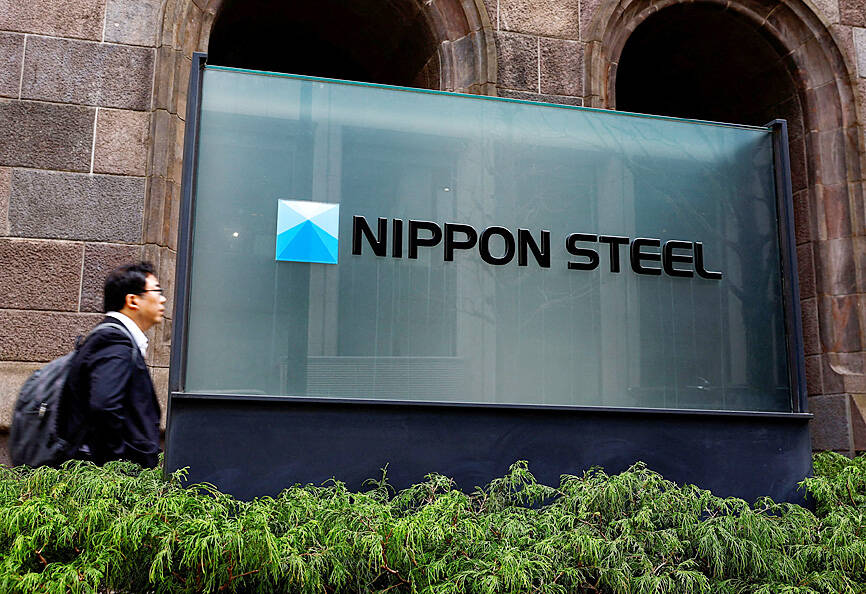Japan’s Nippon Steel Corp is seeing support for its proposal to acquire US Steel Corp in the regions of the US where steel mills are located, Nippon Steel president Tadashi Imai told reporters yesterday.
On Monday, a US inter-agency foreign investment committee referred the decision of whether to approve or block the US$15 billion deal to US President Joe Biden, who has 15 days to decide.
Biden and US president-elect Donald Trump have expressed opposition to the purchase.

Photo: Reuters
Nippon Steel has made a number of commitments to address the national security concerns of the Committee on Foreign Investment in the United States, Imai said, adding that he believed there was “progress in understanding.”
“In the communities of the various regions where the steel mills are located, there is a considerable amount of support for this acquisition,” Imai said. “I hope that President Biden will understand ... the value of this acquisition to the US economy.”
Both companies have previously said they planned to close the deal, which has also faced opposition from the powerful United Steelworkers (USW) labor union, before the end of this year.
Nippon Steel yesterday shared a letter with Biden dated on Monday and signed by two dozen US municipality officials in areas where US Steel mills are located, asking the US president to approve the takeover deal.
“We respectfully urge you to listen to the voices of the steelworkers and everyone else whose economic security is tied to US Steel — they are speaking loudly in unison that this deal must be approved,” the letter said.
USW met Nippon Steel officials twice last week, the union said in a separate statement.
USW repeated its view that the Japanese steelmaker had no interest in the long-term security of US Steel plants or blast furnace operations, and urged Biden to keep the company domestically owned and operated, it said.
To win support for the acquisition, Nippon Steel has previously said it would not use the deal as cover to import steel and has made a series of pledges to protect jobs and invest in US facilities it sees as key to its future growth.

SEMICONDUCTORS: The German laser and plasma generator company will expand its local services as its specialized offerings support Taiwan’s semiconductor industries Trumpf SE + Co KG, a global leader in supplying laser technology and plasma generators used in chip production, is expanding its investments in Taiwan in an effort to deeply integrate into the global semiconductor supply chain in the pursuit of growth. The company, headquartered in Ditzingen, Germany, has invested significantly in a newly inaugurated regional technical center for plasma generators in Taoyuan, its latest expansion in Taiwan after being engaged in various industries for more than 25 years. The center, the first of its kind Trumpf built outside Germany, aims to serve customers from Taiwan, Japan, Southeast Asia and South Korea,

Gasoline and diesel prices at domestic fuel stations are to fall NT$0.2 per liter this week, down for a second consecutive week, CPC Corp, Taiwan (台灣中油) and Formosa Petrochemical Corp (台塑石化) announced yesterday. Effective today, gasoline prices at CPC and Formosa stations are to drop to NT$26.4, NT$27.9 and NT$29.9 per liter for 92, 95 and 98-octane unleaded gasoline respectively, the companies said in separate statements. The price of premium diesel is to fall to NT$24.8 per liter at CPC stations and NT$24.6 at Formosa pumps, they said. The price adjustments came even as international crude oil prices rose last week, as traders

Taiwan Semiconductor Manufacturing Co (TSMC, 台積電), which supplies advanced chips to Nvidia Corp and Apple Inc, yesterday reported NT$1.046 trillion (US$33.1 billion) in revenue for last quarter, driven by constantly strong demand for artificial intelligence (AI) chips, falling in the upper end of its forecast. Based on TSMC’s financial guidance, revenue would expand about 22 percent sequentially to the range from US$32.2 billion to US$33.4 billion during the final quarter of 2024, it told investors in October last year. Last year in total, revenue jumped 31.61 percent to NT$3.81 trillion, compared with NT$2.89 trillion generated in the year before, according to

PRECEDENTED TIMES: In news that surely does not shock, AI and tech exports drove a banner for exports last year as Taiwan’s economic growth experienced a flood tide Taiwan’s exports delivered a blockbuster finish to last year with last month’s shipments rising at the second-highest pace on record as demand for artificial intelligence (AI) hardware and advanced computing remained strong, the Ministry of Finance said yesterday. Exports surged 43.4 percent from a year earlier to US$62.48 billion last month, extending growth to 26 consecutive months. Imports climbed 14.9 percent to US$43.04 billion, the second-highest monthly level historically, resulting in a trade surplus of US$19.43 billion — more than double that of the year before. Department of Statistics Director-General Beatrice Tsai (蔡美娜) described the performance as “surprisingly outstanding,” forecasting export growth